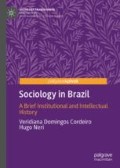Abstract
The military coup of 1964 installed a dictatorship that lasted more than 20 years and completely changed the interests of Social Sciences and its courses. In 1968, universities’ professors and students submitted to the Congress an ante project to reform the cathedratic system. The cobbled project disembogued a law that created new departments, new faculty arrangements and guaranteed lifetime positions for all professors. In 1968, the dictatorship became more violent, and many sociologists and professors were bulk purged. They handled the situation by finding new ways to keep Social Sciences active. Brazilian and foreign funding agencies guaranteed the creation of independent research institutes and individual grants. Other exiled sociologists integrated studies on Latin America issues outside the country.
Access this chapter
Tax calculation will be finalised at checkout
Purchases are for personal use only
Notes
- 1.
A communist movement in 1935, acting against the authoritarian government of Getúlio Vargas.
- 2.
Brazilian authoritarianism represented a kind of capitalist development which excludes the masses and does not attend to social development, being exclusively focused on economic development.
- 3.
Military Police Inquiry is a set of investigations into a supposed military crime and its authorship. It has the character of provisional instruction in order to provide elements for the initiation of criminal proceedings.
- 4.
During the 1960s, some intellectuals, mainly sociologists organized a series of seminars called “Capital,” in which they explored the Marxist tradition.
- 5.
See, for instance Albert Hirschman, The Strategy of Economic Development, 1958) and William Arthur Lewis, The Theory of Economic Growth, 1955, as developmental ideas proponents who influenced Latin America intellectuals.
- 6.
In the Brazilian context, CEPAL, together with ISEB and, despite its programmatic oscillations, the Brazilian Communist Party, PCB, helped to forge and spread the national-development movement.
- 7.
See for instance the sociologist Brasilio Sallum Jr.’s assessment of Cardoso and Faletto’s book: “Even if politics is at the center of Dependency and Development, it is understood quite narrowly… [T]he rules and political–institutional cleavages that shape the participation of the different social segments in the political struggle are scarcely mentioned in the book … [T]he analysis that is done there of the symbolic forms that ‘weld’ each system of alliances, or even, that guide the fight of the collective actors is very insufficient and unsystematic. These symbolic forms appear in the ad hoc form…” (Sallum Jr., 2002, p. 85).
- 8.
As expressed by Oliveira Viana before the 1930s.
References
Cardoso, F. H. (1964). Empresário Industrial e Desenvolvimento Econômico no Brasil. São Paulo: DIFEL.
Cardoso, F. H., & Faletto, E. (1967). Dependência e Desenvolvimento na América Latina: Ensaio de Interpretação Sociológica. Rio de Janeiro: LTC.
Carlotto, M. C. (2014). Universitas semper reformanda?: a história da universidade de São Paulo e o discurso da gestão à luz da estrutura social. Ph.D. thesis, Faculty of Philosophy, Languages and Literature and Human Sciences, University of São Paulo.
Dominguez, J. (1978). Consensus and Divergence: The State of Literature on Inter-American Relations in the 1970s. Latin American Research Review, 13(1), 87–126.
Furtado, C. (1959). Formação Econômica do Brasil. Rio de Janeiro: Fundo de Cultura.
Liedke Filho, E. D. (2005, July/December). A Sociologia no Brasil: história, teorias e desafios. Sociologias, 4, 376–437.
Prebisch, R. (1950). The Economic Development of Latin America and Its Principal Problems. New York: United Nations.
Sallum Jr., B. (2002). Notas sobre o surgimento da Sociologia Política em São Paulo. Política & Sociedade, Florianópolis, 1(1), 73–86.
Author information
Authors and Affiliations
Corresponding author
Rights and permissions
Copyright information
© 2019 The Author(s)
About this chapter
Cite this chapter
Domingos Cordeiro, V., Neri, H. (2019). 1964–1985: The Dictatorship and the Jeopardizing Social Sciences. In: Sociology in Brazil. Sociology Transformed. Palgrave Pivot, Cham. https://doi.org/10.1007/978-3-030-10439-9_5
Download citation
DOI: https://doi.org/10.1007/978-3-030-10439-9_5
Published:
Publisher Name: Palgrave Pivot, Cham
Print ISBN: 978-3-030-10438-2
Online ISBN: 978-3-030-10439-9
eBook Packages: Social SciencesSocial Sciences (R0)

